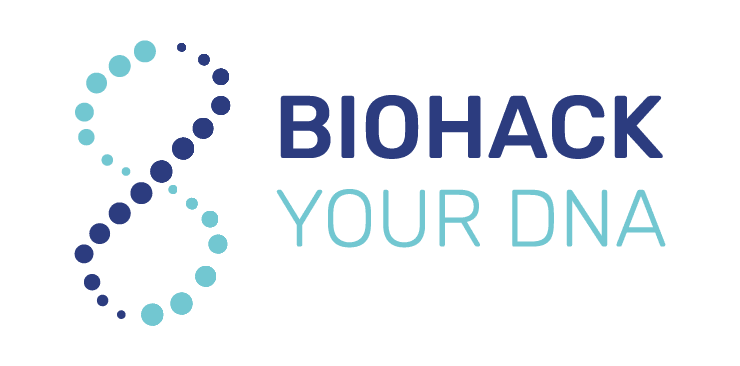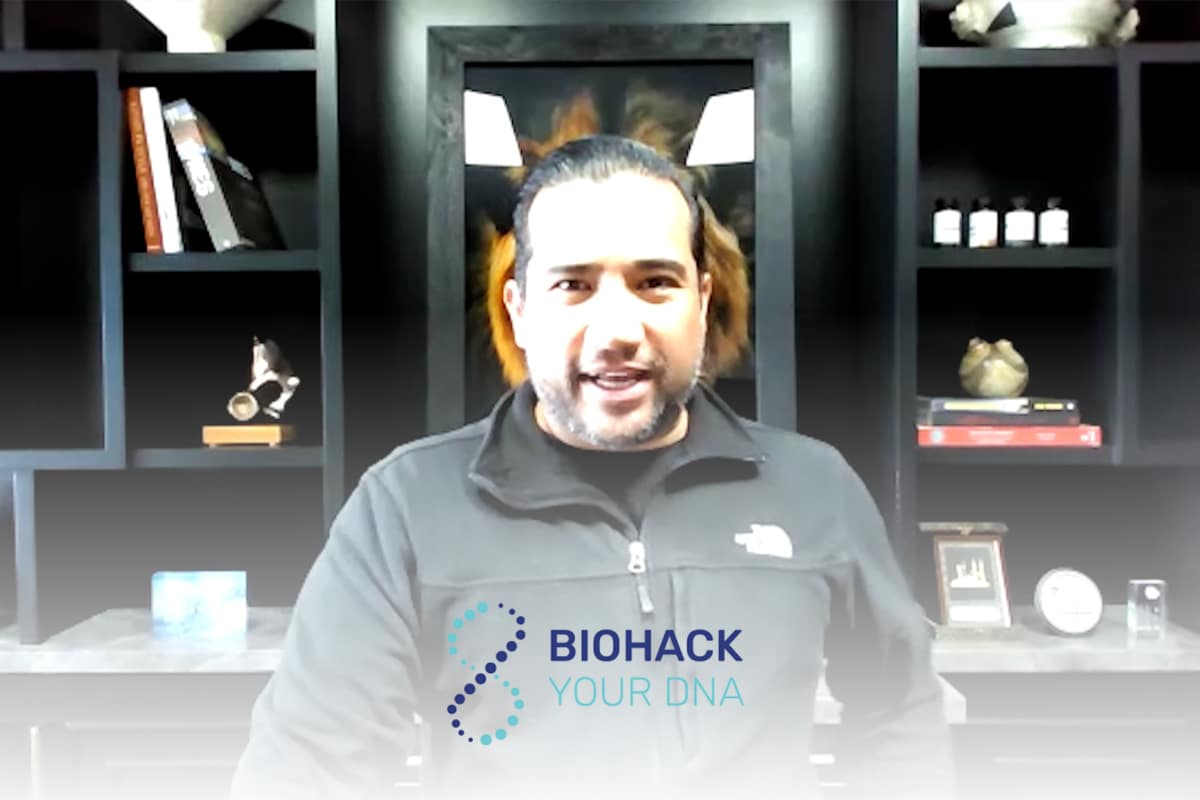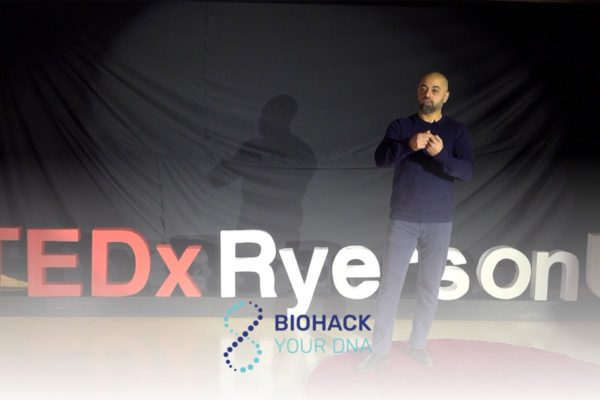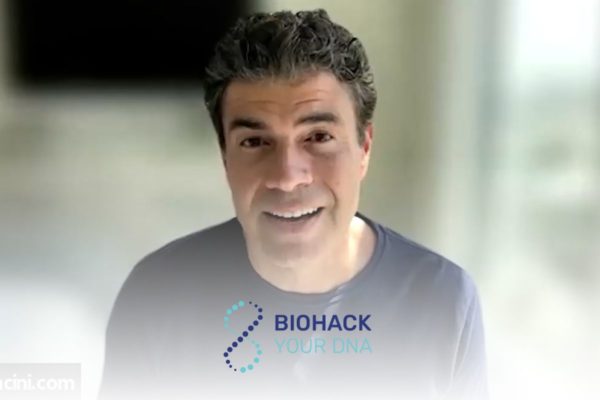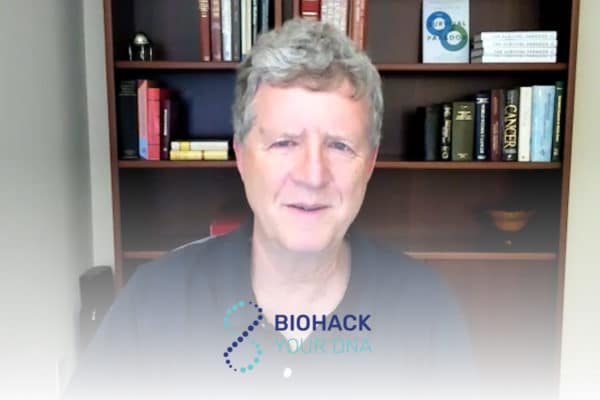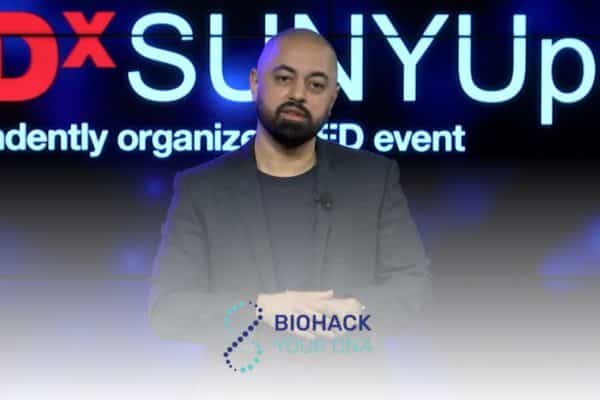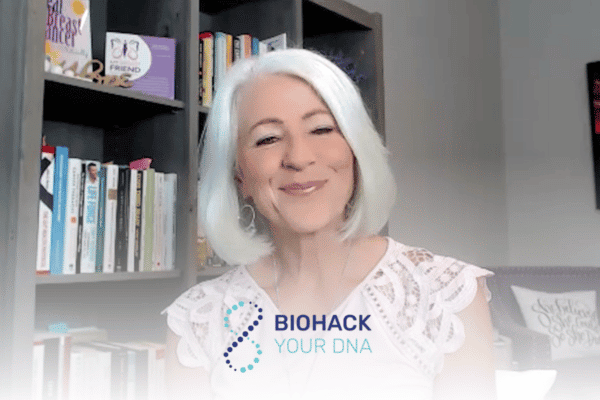Join the discussion below

Kashif Khan is the Chief Executive Officer and Founder of The DNA Company, where personalized medicine is being pioneered through unique insights into the human genome. With the largest study of its kind globally, The DNA Company has developed a functional approach to genomic interpretation overlaying environment, nutrition, and lifestyle... Read More

Kiran Krishnan is a Research Microbiologist and has been involved in the dietary supplement and nutrition market for the past 18 years. He comes from a University research background having spent several years with hands-on R&D in the fields of molecular medicine and microbiology at the University of Iowa. Kiran... Read More
- Why is disease rooted in the gut
- Is the current technology on microbiome testing reliable
- The leading science on supplementing for gut health
Kashif Khan
Hey guys. Welcome back. We are speaking to a pro today, a pro of the gut microbiome labs, which I’m sure a lot of you already have in your pantry and your shelf. You’ve been taking it, but let’s talk to the guy that actually made it for you. So one of the founders of microbiome labs who started this company some time ago and made sure now that every functional medicine doctor across the world is now selling it, making you healthy, we gonna dive deep into why, what’s going on. Why were these things formulated and why is this so important to maintain starting at the gut. So, first of all, welcome.
Kiran Krishnan
Thank you so much for having me. It’s a pleasure to be here today.
Kashif Khan
Yeah, it’s awesome. And it’s awesome to be able to speak to because this area is something that there’s a lot of buzz about, for some people it’s old news, but for the most part for people, it’s newer information.
Kiran Krishnan
Yeah.
Kashif Khan
And you’ve been doing this for a while now. Like when did microbiome to start?
Kiran Krishnan
So we had actually formulated all the plans for the company, our focus, our research and the products in 2012. And we launched MegaSpore in January of 2013. So.
Kashif Khan
Okay cool.
Kiran Krishnan
Yeah, we’re going on, I think nine years now.
Kashif Khan
So what was the impetus like, I, that’s a big jump to say, Hey, we need to start making this product for people’s gut. And where did that start?
Kiran Krishnan
Yeah, in fact it was almost a lucky mistake. If you will in many ways. I had a research company prior to this, company called New Science Trading and Live Smart, where I actually would do conduct clinical research for other companies. So design and run clinical trials for them on their nutritional products. We also had a kind of a technology development company, which is part of the new science where we develop different ingredient technologies and sell it B2B to other supplement companies.
Kashif Khan
Right.
Kiran Krishnan
I would do formulation work and all that. So I had this large multinational company, well actually national company, not multinational company brand that came up to me and said, Hey, we really want to do a deep dive on probiotics. They had a pretty successful product in the market, but they were seeing a lot of different competitors coming into this space. So they really wanted some next generation of a probiotic. They also wanted us to investigate this issue of, refrigeration versus non refrigeration. Does that, what’s the science behind that? Does that make any sense dosing? do we need to be at 100 billion, 200 billion as the numbers kept scaling up and up, how many strains do we need? And just basically everything around the whole probiotic, product development and marketing and so on. So we started doing a deep dive on it and I looked at it for the first time as a microbiologist. And up to that point, I kind of considered probiotics lightly as a consumer, but I never really used any ’cause it just intuitively didn’t make a lot of sense to me how some of these things were done and formulated. But then when we went through this deep dive and we started digging in, we came to find out that there’s a lot of nonsense in the industry, right.
Kashif Khan
Right.
Kiran Krishnan
No surprise, that’s just the nature of our industry. There’s a good portion of it. That will be a nonsense. And then in talking lots of doctors and practitioners many kind of shared the same issue, like, yeah, I don’t really know. I believe that probiotics should work, but this one and this one and this one I’ve tried don’t really seem to do anything. Or this one that worked for a little bit now it stops working and it kind of kept hearing the same frustration around the concept of probiotics. And then as we went through the process, we discovered these Bacillus endospores and just looking at the signs and looking at it from a microbiologist perspective, it became very clear that that was kind of the next generation of probiotics, right. Like this is the right approach. These are what this aims will likely do. Here’s all the clinical research you should do to validate that. And this is how you would formulate the product. So I actually created the MegaSpore formula to give it to another company.
Kashif Khan
Alright.
Kiran Krishnan
And so we went, and by the time we were done with the work, the company had changed ownership ’cause they got bought out by larger group. And so the new owners were kind of like, yeah, we’re not really interested in this. There’s nothing we can do about it with it. So we said, okay, we’ll take it. And then to me that information was just too compelling. So we actually took it to a number of different companies, ones that I’ve worked with in the past, either as a consultant formula development and all of them passed. And the one of the main reasons why they passed on it was we were proposing a probiotic product that was 4 billion CFUs, right. And they couldn’t wrap their head around, how are we gonna sell up 4 billion CFU. Our product is 35, 40 billion CFUs, right. The value in the probiotic was all tied to the CFU count, which was one of the things we were disproving is that, there’s no scientific validation to that increasing CFU count. So everybody passed on it and we were basically like this is too important, that this product can really make a difference in people and lots of the stuff out there is really not doing much of anything. We gotta get this out. So that’s when we decided to do it ourselves. So if any one of those companies decided to move forward with it and could see kind of the vision and value of it, we wouldn’t be here today. We wouldn’t be, microbiome labs wouldn’t exist and Megaspores wouldn’t exist. It just it’d be under a different name.
Kashif Khan
So you put your entrepreneurial hat. And so this is too good. I can’t let it go.
Kiran Krishnan
Exactly.
Kashif Khan
The drive got to you, which often happens with entrepreneurs like us. So.
Kiran Krishnan
And I kept thinking about like what the thought that couldn’t escape me was just thinking about the people that are going on and spending their hard earned dollars, buying products with the hope that it’s doing something, right. And it’s not actually doing anything and I’m sitting here going, this can really help, right.
Kashif Khan
Sure
Kiran Krishnan
We had to do it. I mean we were so compelled and that’s kind of how we built the company quite aggressively because we went out there with this like aggressive passion to get this in the hands of people.
Kashif Khan
Right.
Kiran Krishnan
And that was a big propelling that drove us.
Kashif Khan
And it seems like you started from sort of the context of precision because often when it comes to the supplement industry, there’s pixie dusting, which is unfortunate, a little bit of an ingredient to make a claim on a label and you feel like you think you’re getting it, but you’re really not, at least not to a therapeutic dose or there’s, overdosing where you may, there’s certain, we’ve learned genetically certain ingredients that will literally have the opposite effect when you give too much, right.
Kiran Krishnan
Yes.
Kashif Khan
Or you’re just peeing it out. It’s like expensive yellow P so what’s the point.
Kiran Krishnan
Yeap.
Kashif Khan
So, but what you said is here’s the precise tool that people actually need. It’s we’re not, we’re not going marketing first. We’re going efficacy first. Right, and that’s what you built. So we always believe that the gut is the sort of second half of personalization. We deal with genetics. We understand here’s the human blueprint.
Kiran Krishnan
Yeah.
Kashif Khan
Here’s foundationally how you’re wired. So I can, without meeting a person, understand where they’re suboptimal, where they need support, how they behave, how they feel, it’s all wired, all those chemical reactions driven by genes. But that is kind of like this human that’s wrapped around this gut where there’s a a whole other system, firing and doing its own thing. There’s a lot of companies today that are trying to decode that.
Kiran Krishnan
Yeah.
Kashif Khan
And it seems like you kind of skipped a step and said, well, even once you figure it out, people still need to know, what do I do about it.
Kiran Krishnan
Totally.
Kashif Khan
Right.
Kiran Krishnan
Yeah.
Kashif Khan
So we can decode every one of the trillions or billions of bacteria strains. But if you’re not, if there’s no product in the end, you’ve got information, but no action item, which is awesome in terms of what you did. So how important do you think it is to understand, and sequence and put AI to the actual gut microbiome versus the solutions at work?
Kiran Krishnan
Yeah, and I think if we went with the AI machine learning data science approach first, it would be years before we had anything that had any positive impact on people, right.
Kashif Khan
Right.
Kiran Krishnan
Because that is abyss that you can just go deeper and deeper and deeper in.
Kashif Khan
Yeah. And there’s a massive translational gap there,
Kiran Krishnan
Yeah. Right, so like between what you discover and how do you make that a practical solution? There’s a massive gap. That’s actually one of the things that I am and a big group of us are working on right now at Nova Designs, which is our new parent company. They have a massive investment in data science and they’ve acquired a couple of companies in that space and we are having regular meetings on how do you use the insane amount of technology and data that’s available in data science. And, and then how do you make that relevant to people?
Kashif Khan
Right.
Kiran Krishnan
How do you make it a product that changes live? Right. And we are far away from that. And so fortunately what we were able to do in the interim was figure out some basic things that we need to change and improve in our microbiome that can be done with the right probiotic strains, the right prebiotics, the right polyphenols. And a lot of that is just taking clues from nature, right. How we subsisted throughout the course of human evolution, what were the things we consumed to build this microbiome? Right, what were the, what are we finding out from the hunter gatherer times that exist today? When you compare them into the modern, industrialized human, right. When you look at those gaps, that’s where you start to find the magic in the simple things you can do to start bringing back our microbiome more towards its natural state. And in the meantime sure. Let’s dig, dig deep into and dive into the whole, massive data science, and if we can get AI to make some sense of all that, but we have to do something now too, right.
Kashif Khan
Right.
Kiran Krishnan
And that’s the balance we’re striking. Fortunately, we went with the, let’s do something now, philosophy first. And then now that we have the capability and resources, we’re looking into the other side as well, right.
Kashif Khan
Yeah.
Kiran Krishnan
Maybe some things that come out, but it it’ll still be a couple years.
Kashif Khan
So the goal is to move the needle and get some people get people an outcome, right.
Kiran Krishnan
Yeah.
Kashif Khan
And essentially that sort of anthropological route you took which we could just study people and understood what we’re wired for. The way we live today. It’s kind of like so, our DNA is 250,000 years old. We are the same as people of that time. It’s only the last 10,000 years that we’ve been sort of agricultural and civilized. And it’s only the last couple hundred years that we’ve been industrial to this degree that our guts are subjected. And it’s only really the last generation that our food supply is what it is now. So what you’re saying is that huge data, great data is dumb until you know what it’s tell you and somebody has to go build something out of it, right.
Kiran Krishnan
Yeah.
Kashif Khan
Other than that it’s a bunch of information that is not gonna drive anything. Meanwhile, you just went through a simple, like here’s what people did for 250,000 years. Here’s what’s where we’re doing wrong today. Let’s build a gap, right. Let’s, fix it, right. And that’s a very simple solution. So how important is it to then actually understand your gut, like your microbiome to taste, for example like a Viome type test to know whether you need this or not, or is this sort of like, no, everybody needs this because we’re all suffering from the same environmental exposures and poor food etc.
Kiran Krishnan
Yeah, so that’s a really important question. And that was a question that we set out to answer about five years ago, right. So one of the most common questions we got from clinicians, as they’re trying to understand the microbiome and trying to utilize the microbiome in their practice, the most common question we got is, Hey, I have a patient, my first patient day is dealing with diabetes and I know something’s wrong with his or her microbiome, right. Because that’s connected to these metabolic dysfunctions, but can you tell me how I figure out what’s wrong with that person’s microbiome and what I should do about it versus my second patient who’s coming in, who’s autoimmune. I know the microbiome plays a role there, but how do I know what’s wrong with that microbiome? And how do I fix it? Right. And then the third patient’s coming in with reflux, and I know the microbiome plays a role there, but what’s wrong with that. And how do I fix it? Right. So when you look at these seemingly unrelated conditions that present very differently, diabetes, autoimmune disease, maybe it’s on the skin and then reflux, right.
They seem completely unrelated. Although intuitively and based on research, we know that the microbiome plays a role in each of those. But the big question is what is wrong with each of those microbiomes and how do you go about fixing it? So that was the big conundrum that we had. And we started digging into the research and mapping everything out and just kind of putting all the signs together, what we’ve come to find out, which is actually a bit of a relief is that the dysfunction in the diabetes gut is exactly the same as the dysfunction in the reflux gut. And it’s exactly the same as the dysfunction in the autoimmune gut, right. Even though those conditions are seemingly unrelated, ’cause they present so differently. The underlying fact in a dysfunctional microbiome that allows for those conditions to flourish is exactly the same, right. All three of those conditions have low diversity in the microbiome, which pres provides the risk factor for developing those conditions.
All three of those microbiomes have low levels of keystone species like Achromasia, like fecal bacteria Bifidobacterium longum, all three of those microbiomes have low levels of short chain pad acid, production and other postbiotics all three of those microbiomes also have intestinal permeability, right. So they have high levels of LPS and other endotoxins and circulation. And the studies on the pathologies and the pathophysiologies are all there, right. If you look at the pathophysiology of reflux disease, you’ll find it’s the same exact dysfunctions that lead to it as diabetes, as depression, as anxiety, as Alzheimer’s, right. So that was very revealing to us. And we found that there are certain universal truths within a healthy microbiome that we all need, right. So we all need to deal with intestinal barrier dysfunction. We all need improvements in diversity, we all need more keystone species.
We all need more postbiotics like short chain fatty acid. So then that became foundational for us, right. Now you can do a microbiome analysis. Like we have one Cobham effects, right. Which is a whole genome sequencing analysis that really looks at functional aspects of the microbiome. So we’ve changed it up a little bit than what is typically out there, but that’s really to get a even deeper look as to some of the dietary and lifestyle and other things that you would want to tweak or some additional supplementation that you might want to add beyond the foundational and tools the foundational is foundational, right. Everybody needs that.
Kashif Khan
And the foundational is kind of where the majority of the impact is meaning that delta value between let’s fix what everybody needs or that personalization of let’s scan my gut, which is maybe five or 10% of that debt personalization difference, right. Versus the 80%. So it kind of speaks to what we’ve been sort of screaming from the rooftops that
Kiran Krishnan
Yeah.
Kashif Khan
Your gut is it’s that half a personalized where we know that it is a load on the system, but what disease is gonna express, we believe that it’s been looked at wrong, meaning you not gonna sequence the gut and then figure out this bacteria is this disease, this bacteria is this disease.
Kiran Krishnan
Right.
Kashif Khan
It’s more like this is a hub
Kiran Krishnan
Yeah
Kashif Khan
And reason for why the bodies metabolically unhealthy. Now genetically we can figure out where are you suboptimal? And we know what disease is gonna happen, right. If you have poor cellular structure in the endothelial, well, you’re probably gonna have a cholesterol problem in heart disease. If you’re estrogen dominant and you’re already having an estrogen toxic load on your system, you may end up with ovarian cancer, a breast cancer, if so, there’s, it’s kind of pairing. And like you said taking a more functional approach and that big data, I think the impact versus what you’ve already done.
Kiran Krishnan
Yeah.
Kashif Khan
Which you can then pair to genetics and understand where are you, not doing well. You could predict what disease is coming,
Kiran Krishnan
So, yeah.
Kashif Khan
And you can prevent, so the bulk of the work is already done. So the of good news is that people can take action right away. They don’t need to wait for the big data solutions.
Kiran Krishnan
Totally.
Kashif Khan
Yeah. So-
Kiran Krishnan
totally. It’s, to me, it’s going back to kind of basic truths about just healthy living, right. We know universally it’s good for 99% of people to get some activity in your life lifestyle, right. To diversify your diet to a certain degree, to get enough sleep, right. We know that those are fundamental truths about kind of just being generally healthy. And that’s the same with the microbiome. There’s a general wellness level to the microbiome that we are not achieving right now, because of course the world around us that we are all that we’re all susceptible to works against that general level of healthiness within the microbiome, right. So that’s the main thing that we need to start addressing and tweaking before getting super deep dive into.
Kashif Khan
Right
Kiran Krishnan
All of the individual microbes and so on, right.
Kashif Khan
So you’ve done a great job sort of on the solution side. Do you have any thoughts or research on sort, what are the biggest threats? What are the things that are causing that sort of, an unbalance?
Kiran Krishnan
Yeah, so we’ve done a couple of studies on common drivers of dysfunction. So number one, one of the most interesting studies we did and, and I think it’s published now is this study on an impact of glyphosate exposure, Roundup exposure on a pediatric microbiome, right. So we were one of the first to do a on that showing that you, we could take what was really kind of a pristine pediatric, a three year old microbiome, a three year old’s microbiome, and then exposing it to approved levels of Roundup for a three week period was enough to alter the microbiome, to appoint where it started looking like the microbiome was somebody suffering from inflammatory bowel disease, right.
In a three week period. And then we were able to fortunately be able to start recovering it once we started using the spore probiotics and things like that, even though we works continuously exposing it to roundups just yet. But that’s one of the most profound things we saw is that how quickly the microbiome can be damaged and start looking like a disease microbiome with exposure to chemicals. So that’s one of the key ones that we looked at. And then we also looked at couple of dietary components or people for example, people with liver failure, we did a study on their intake of protein and saw that even, slightly too high a protein can be really disruptive to them because they can’t clear ammonia well, right. And so protein metabolism will increase their ammonia production.
And that actually creates increases of pH in the gut creates sign dysbiosis and can also disrupt them overall metabolically and in systemically as well. So we’ve done some work on that and we wanna do more in that space, but and we wanna do a couple more, we’re doing a study on antibiotics coming up and there’s a number of studies already on antibiotics, but we wanna do more a pediatric population, which is gonna be interesting to us because most of the studies on antibiotics are on adults, right. In terms of how the antibiotics impact the microbiome, what it would be super interesting is to see, how much more or less it impacts a pediatric microbiome, right. What is the profound change? And can that be recovered? Do you see the, any recovery naturally or with intervention? So those are the areas we’re going into.
Kashif Khan
And we, you said you did the work of understanding three weeks first of all is mind blowing.
Kiran Krishnan
Right.
Kashif Khan
How quickly it could happen, yeah.
Kiran Krishnan
Easy.
Kashif Khan
Yeah, and imagine the 30 year old with auto autoimmune condition, wondering why if three weeks can cause something measurable. Well, what if you did it for 30 years.
Kiran Krishnan
Exactly.
Kashif Khan
And
Kiran Krishnan
We’re talking about parts per million level, right. Of the, of this kind of chemical exposure. So it’s not even like we’re dosing it at milligram doses. It’s parts per million doses.
Kashif Khan
Yeah, and then you have the parents that argue, that it was the day that that environment changed, whether it’s some shot or some environmental exposure that my kids started expressing, something that way labeled as autism, right. And then the clinician and the scientist will argue, that’s not how it works.
Kiran Krishnan
Right.
Kashif Khan
It’s a genetic condition. But how do you argue with parents that say, well, it used to be one out 10,000 kids. Now it’s one out 60.
Kiran Krishnan
Exactly.
Kashif Khan
The kids didn’t change. We can attest to the DNA is the same.
Kiran Krishnan
Yeah.
Kashif Khan
If the load or the exposure. So would you suggest, or I don’t know if the research is done yet that if parents were to start working on supplement early, that things of this nature, like autism could be prevented.
Kiran Krishnan
Yeah, not only supplementing early in terms of child, but even arguably more importantly for the pregnant mom.
Kashif Khan
Right.
Kiran Krishnan
Because a lot of the risk factors that lead to an autism like gut, right. And there’s a pretty signature gut microbiome for kids on the spectrum. There are certain pathogens that tend to be high. Like Clostridium bolteae. There are, certain probiotic organisms that tend to be higher than in kids without autism. There’s low diversity issues. Again, there’s too many, too much production of branch chain, fatty acids. And like all these, there are very signature elements of an autism gut. And part of the scientific studies show that development actually occurs in utero based on what’s happening with mom, right. So we know that, for example, in humans, obese moms, overweight moms tend to have higher risk for delivering kids on the spectrum, right. And we know overweight and obese moms tend to have different microbiomes and they have different profiles in their circulation.
They have higher levels of LPS and other endotoxins that impact inflammation. We also know that there are compounds are made in mom’s microbiome that are essential for the development of the baby’s brain. For example, peptidoglycan, right. There are microbes in mom’s gut that produce peptidoglycan and release that peptidoglycan into mom’s circulation. And the placenta has receptor sites and transporters for peptidoglycan for bacterial peptidoglycan, transporting it to the baby’s brain where the baby’s brain has receptor peptidoglycan. And the studies show that when you bind peptidoglycan, it initiates synaptogenesis it initiates different cellular differentiation in brain development. It initiates a production of their blood brain barrier and also the neurological growth in the brain itself.
And if you don’t have enough exposure to peptidoglycan, you actually get certain levels of stunting of neurological growth and brain development. So it’s almost even more important in gestation where a lot of these changes can affect the growth of the fetus. And then once the baby comes out, there are some triggering elements, right. Like you said, there are literally thousands of moms that will swear up and down that their baby is fine until they got the shut, right. And then the day after they notice a difference, right now that’s not scientific in the traditional scientific sense, but like you said, you can’t ignore those moms, right. They know their child way more than any scientist will ever know from doing a double blind placebo control study. And then you might not be able to find to direct causation between that shot and the development of spectrum disorders. But what that indicates is that that child system was vulnerable, right. And that shot is what we would call an environmental factor that triggers and spins the body outta control. That’s the same thing in autoimmune disease, right.
It’s pretty clear the work that Fasano and the people at Harvard have done is that you need that third element, that environmental factor that then triggers the autoimmune response, right. You have genetic susceptibility from snips on nod to receptors and so on a number of different things, then you have severe dysbiosis, right. So there’s a gut associated risk factor. And then you need that environmental trigger, which can be of course, antibiotics. It could be a bad, cold or flu. It could be a shock of some sort. So we can’t ignore, the empirical evidence that we have, that there are triggers that can create this kind of problem in susceptible children, right. And not all children in susceptible of course, ’cause you can have 100 million kids get a shot and be fine. And then that 101 million kid will get something happening, right. But we still have to appreciate why was that child at risk of developing something? And the studies are clear that even in utero that’s where things can, will start to go awry.
Kashif Khan
It’s incredible because I mean, expecting parents aren’t taught to think that way, right. And you, so you give the example of this sort of obese expecting mother and what it took the foods that it took to get there. And we already know what those foods, how they’re reeking havoc on the gut. So I guess it’s no surprise that you would end up with at a state where the guts, screwed up, right. And it’s gonna lead to this sub operability, like you said. So would you recommend that people, do a stool test, send their samples in and is the, are the apps and the technologies that people are promoting in terms of here know what to eat based on your gut? Are they mature enough or are they still kind of in research phase?
Kiran Krishnan
Yeah, I think there are some aspects of it that can be really helpful, but it really depends on whether or not you have the symptoms also, right. Because like your genetics, same thing with the gut, there’s tendencies and risk tried based on what your genes, snips look like, what your genetics look like and same thing with what your microbiome looks like. But it doesn’t necessarily mean that the phenotype will turn out that way, right. Because there are many controlling factors in there in terms of gene expression and so on and so the same thing with the microbiome. So you can get a test right now and it’ll tell you things like don’t eat spinach, right.
Kashif Khan
Right.
Kiran Krishnan
Does that mean you shouldn’t eat spinach? Likely not because the signs between picking up this cluster of organisms or this cluster of RNA to eating spinach is bad for you. There’s still a massive gap in there, right.
Kashif Khan
Right.
Kiran Krishnan
And how you translate that is still for the most part, in many other companies that are doing it, it’s still a black box, right. They’re not revealing how they make those translations. And so that is problematic. And so when you look at translative science between microbiome, meta-genomics, what we refer to as meta-genomics and then how your behaviors should change based on this data, you have to look at the things that are drawn up by consensus, by lots of researchers studying it, right. And there are still a few things so, for example a couple of things that we have found is sulfate-reducing bacteria, right. So if you have high levels of sulfate-reducing bacteria and you eat lots of foods that are rich in sulfates, you gonna end up with large follow dis distress. Because these foods, even though many of them are quite healthy foods, like you take, mushrooms and leeks and all these, there’s a number of vegetables, sa crowd and not sorry not sa crowd, but what sa crowd is made cabbage and things like that. Yeah.
They tend to be high in sulfates, right. And most people can endure ’em just perfectly fine and get all the benefit out of them. But people with high sulfate reducing bacteria will reduce a good amount of those sulfate into hydrogen sulfide. And that hydrogen sulfite is gonna cause inflammation in the large bowel. Now, even if you have sulfate reducing bacteria, it doesn’t mean all of it’s gonna get turned that way. But if you have the symptoms and you have sulfate high levels of sulfate reducing bacteria, then it’s a good idea to cut back, right. For example, you have large bowel distress, you get a lot of diarrhea, you get a lot of food sensitive issues, all of these things that indicate inflammation in your large bowel and your microbiome analysis tells you, you have high levels of sulfate reducing bacteria. That’s a good time to try to adjust that behavior.
Kashif Khan
Yeah.
Kiran Krishnan
So there’s a few of those things, right. That are pretty clear across the board. And it has to be paired up with the symptomology. ‘Cause if the symptomology is not there, then there’s likely some way that that’s being overcome in your gut, right. And there may be another back set of bacteria that are breaking down the hydrogen sulfite. So it doesn’t cause you that problem.
Kashif Khan
Right, and I think based on what you said, that visceral response like it, I had a symptom, one thing we’ve seen is there’s certain foods that people aren’t actually getting what they think they’re getting. Meaning for example, something like hummus seems like it, it would be in the health food category.
Kiran Krishnan
Yeah.
Kashif Khan
Right, and it seemingly clean but guess how many chemicals are used to dry chickpeas so that they can ship that.
Kiran Krishnan
Right.
Kashif Khan
Right, and if you’re not, drying the chickpeas yourself and which most people aren’t things like bread, people wonder, well, my ancestors eat bread, the people have been eating bread for a long time. Yeah, but same thing, there’s chemicals used to dry the wheat, which in Europe are illegal and in Canada where I am, because we have long winters that ramp into usage of them in order to survive, we need bread.
Kiran Krishnan
Yeah
Kashif Khan
So it’s you often, there’s a mismatch to, well, my app said I could eat this, but I still don’t feel right.
Kiran Krishnan
Totally.
Kashif Khan
So, yeah. So you have to, like you said, how do you feel you, you gotta measure and track and take charge yourself. That’s, there’s guidance definitely accept guidance. But a lot of this stuff, how much of it is a visceral response and how much of it is you can feel inflammation. This is gonna lead to a disease in 10 years.
Kiran Krishnan
Right, and that’s a really important question. Now, you can’t feel information kick but you can certainly measure it, right.
Kashif Khan
Right. And I think that’s one of the important factors where we always promote working with some sort of health pro professional,
Kiran Krishnan
Right. Because I think it’s important for people at any age almost to kind of get a sense on where their body is from a immunological and metabolic profile, right. We do our normal, a lot of people have these kind of wellness programs where they check your vitals, your blood pressure, your heart rate, they look at your cholesterol. they look at those basic things, but what is what is clear and it still battles me that this isn’t part of a regular wellness checkup. What is clear is that inflammation is the driver of all of these problems, right.
Kashif Khan
Right
Kiran Krishnan
Inflammation has to exist in order for many of the chronic illnesses we deal with to actually show up, right. We know that aging is driven by inflammation. We know that it’s called inflammaging. So I don’t know why we don’t have a regular check on our inflammatory status, right. Whether it’s simple things like high sensitivity CRP, Interlukin-6, Interlukin-12 in just a simple panel A cytokine panel of some sort. But to me that’s something that’s absolutely critical for people. You have to get a sense on where your level of systemic inflammation is, at least once a year or twice a year, right. And like you said, there are lots of those silent culprits where your current diet, the things you’re eating you may not feel it, but it may be setting you up for foundation of chronic illness because of the inflammation it creates. But you would know, you wouldn’t know that until you test it.
Kashif Khan
So it sounds like, if someone were to ask you, okay, well, if I take action on this and I start to take care of my gut, what kind of diseases can I prevent? And it sounds like the answer is well, everything because
Kiran Krishnan
Yeap
Kashif Khan
Yeah, if inflammation is the root and it’s not the only reason why diseases happen, but we’re saying that for a large part, if you consider how we eat and what we’re what’s available to us, the environmental exposures, the chemicals, things that you don’t even know you’re exposed to, cooking on Teflon that seems safe. But for some women, it’s a hormone disrupter and causing problems, so really what we’re saying is you name a chronic disease.
Kiran Krishnan
Yeah
Kashif Khan
We can probably bring it back to the gut in some way or the other.
Kiran Krishnan
Yeah, inflammation is a key aspect of it. And the biggest source of chronic inflammation is a DYS gut. And the intestinal permit that goes along with it, there’s this the condition called metabolic endotoxemia, or it sometimes referred to as postprandial endotoxemia. And that’s the leaking through of LPS, which is an endotoxin that’s produced largely in the gut. And then all of the inflammatory havoc that creates in the body. I’ve written a couple of chapters now, one for a functional medicine textbook. And then another one for another book that’s actually being published where we go through just dozens and dozens and dozens of references on meta-analysis studies and so on showing how this type of inflammatory response is that the root cause of the vast majority of chronic illnesses, and it’s much harder for chronic illness to develop if you don’t have that inflammation, right. So you have the genetic risk, many of us have all kinds of genetic risks and then you have environmental triggers. But if the inflammation is not there, you still have some resiliency against the condition. And so it becomes so important to manage and handle that inflammation in your body. And most people have no idea where their inflammation is until it’s too late, right.
Kashif Khan
Yeah.
Kiran Krishnan
Until they feel, and they now they’re diagnosable, whereas that condition was brewing in their system for the last seven, 10 years.
Kashif Khan
Yeah, it’s challenging because the system you rely on, isn’t designed to do that work, it’s designed to mask the symptom. And do you have any challenges where what we’re talking about is eliminating chronic disease. If this is done properly and through and through to the end, do you have challenges in with resistance, meaning that, the certain parties are saying, we need to get rid of these guys.
Kiran Krishnan
The biggest resistance comes from the interventions that we would use, right. So because we have the capability of developing and validating and utilizing low cost, natural, non patented, interventions like simple things like probiotics and probiotics and all that. That’s where most of the resistance is because those, at some point become competitive to the bigger drug markets, right. The prescription drug markets, that’s where the resistance comes from. There Isn’t so much of resistance on, you’re making people well, which means that they’re not a big market for us because this wellness world that you and I are in is still a teeny, teeny, teeny fraction of the total population, right.
Even though we reach a lot of people and we talk to a lot of people and we engage, when you really look at it, you go, wow, we live in a tiny little bubble of wellness, right. The vast majority of people out there have zero clue that any of this exists, they’ve never heard of a summit. They’ve never heard of, they don’t use a probiotic. They’ve never used any of this stuff. And they just kind of go to their regular doctor, once every few years or when a problem comes up and that’s it, right. They might be drinking Diet Coke, still thinking that they’re doing something healthy, right. That’s the mentality in the vast majority of people.
Kashif Khan
Right.
Kiran Krishnan
Right, so we’re not challenging their market in the sense that the pool of sick people that they have and at their disposal, but it does become uncomfortable when low cost, natural interventions start to catch on,
Kashif Khan
Yeah.
Kiran Krishnan
Because then that can be a threat to the bigger markets of prescription products and all that. And again, not that every prescription product is bad in any way, right. There are many things that people need to take and can help and can save lives, but it’s just not the, it shouldn’t be the predominant way of doing health and medicine,
Kashif Khan
Yeah. Especially when it comes to chronic conditions like acute conditions.
Kiran Krishnan
Exactly.
Kashif Khan
We understand solve the problem, emergency get it all the way. But even then, even with the acute condition, there may be something underlying that needs to be resolved once you put the bandaid on, right. So, do you see, there’s a lot of work you’re doing behind the scenes, in research and with other companies, do you see a day where this becomes sort of common practice and you walk into your primary care MD and your gut’s been already mapped, and that’s the map that you work off of.
Kiran Krishnan
100%, yeah. We knowing all the things I know from behind the scenes, all of the work that’s going on in the data science, AI side, working with, having some connection with insurance companies and corporate wellness, and then the big CPG companies, I work on number of products, projects with big CPG companies. There’s a massive, ground swell of interest in reshaping the paradigm around health, right. And I think the big motivator for that, from all of these corporations and Institute and all that is because the consumers are demanding that.
Kashif Khan
Yeah, right.
Kiran Krishnan
They getting more and more that way. right. So every time anyone that’s listening to this, right, anytime you make a choice on a healthier option, right. Or anytime you sign up for a yoga class, or anytime that you do, you go to this meditation retreat, or you go and get your gene, your genetics tested just for wellness reasons, right. Those are of the things, those things are recorded, right. Everything we do is recorded and and datafied, right. And so all of these companies have access to that kind of information. So they’re seeing this swelling of interest in wellness and preventative, notions and also in customers really wanna to understand their bodies better, right. So they’re seeing the number of people that are using 24 hour glucose monitors and Oura Rings and doing genetic testing and all that stuff.
So they’re all starting to realize that that’s the future, right. That people want to know what’s going on in their body. They want to be in control of what’s going on in the body. They want to haves them, say in how they live in how their health and wellness outcomes look like. They’re no longer just gonna wake up and count on their doctor for their health, right. That’s not the future. And so there is a massive groundswell level of investment that I’ve never seen before in that side of the world. So there will be a time where you go to poop in the morning and your toilet is reading how a number of metabolites in your stool and the gases coming out, and then even looking at certain genetic primers in your microbiome, and then sending that data to your health cloud. That’s also measuring it from your sleep sensors on your bed, from your metabolic your metrics, biometric sensors on your fingers. And your toothbrush is measuring your oral microbiome levels. All of that stuff is happening. And actually probably be come to fruition sooner than we think, probably in the next 10 years, I would say.
Kashif Khan
That’s very cool. So essentially, it’s kind of like this democratization, we’re taking this hierarchy of, I start with my doctor, that’s the gatekeeper, and then I can access other stuff, right. And it’s all siloed versus my health cloud, you said it’s so beautifully. Here’s my health cloud and the data’s already there. And it should be in real time. I should not be waiting for something.
Kiran Krishnan
Absolutely.
Kashif Khan
I should be triggered that by the way, this is off that’s off. ‘Cause we are, we know these things already, the technology now exists. It’s just the adoption. And I think when it’s at that point, the clinicians will be using it as a tool. You’ll see in primary care that you’re not going for visits. You’re picking up your phone and your clinician is actually reaching out to you and say, Hey, something’s off.
Kiran Krishnan
I got these alerts.
Kashif Khan
Yeah, did you not sleep properly last night? Like what happened? So
Kiran Krishnan
Totally I just took, I should mention, I just got a new bed yesterday, which was absolutely fascinating. It’s one of those sleep number beds, right.
Kashif Khan
Okay.
Kiran Krishnan
And I got it because I just want to be able to recline up while I’m at night, even watching TV. That was my main motivation, right. But I didn’t even realize all the things it does. So then I slept on it last night and I opened up the app this morning. It had all of these biometrics for me to measure.
Kashif Khan
Yeah, that’s cool.
Kiran Krishnan
It measured all the different cycles of my sleep. How long I slept, my heart rate variability, my respiration and rate all this stuff. And I was like, holy cow.
Kashif Khan
Yeah.
Kiran Krishnan
This thing is getting now. I’m like motivated to improve my sleep score. So tonight I’m like, I’m getting to bed by midnight, for sure. I want the score to go up. So yeah, it it’s all there. It’s all gonna start coming together in a singular hub that you, your healthcare practitioners, your doctors all will have access to. And it’s all gonna be preventative, which is gonna be awesome.
Kashif Khan
Cool. One last thought in general, nowadays, whenever we talk to anyone that’s called up in the biohacking wellness type space and we ask them, what do you suggest? Like, forget if take everything aside. What’s the one or two things people should do. And more often than not, it’s intermittent fasting and good sleep, is there a connection between those two things and the gut?
Kiran Krishnan
Oh, 100%, yes. So I’m glad you asked me that. ‘Cause if you would’ve asked me what are two, couple things you would do? I would’ve probably laid out the same things.
Kashif Khan
Okay.
Kiran Krishnan
And I started intermittent fasting about four years ago is probably one of the best things I’ve ever done for myself, especially because I travel so much and I eat everywhere. I’m eating outside 98% of the time, right. And then sleep is something I’m battling to do better this year. So intermittent fasting, in fact increases the diversity within your microbiome, which is counterintuitive, right. You’re like, wait, so not feeding my microbiome increases diversity. Yes. Because your microbiome is layered with different types of operators. You’ve got this top layer of primary fermenters or primary digestors. They digest all of the big macromolecules that come into your diet, right. And then they create all of these secondary metabolites that feed the next layer of microbes that then need time to break down the secondary metabolites and produce tertiary metabolites. And during each of those layers of fermentation and digestion, you’re getting all of these bioactive molecules that we need for our overall health and wellness, right. So the secondary and tertiary metabolizes stop functioning when more food comes in.
So we actually need periods of not having any food entering into the system in order for us to actually increase the diversity of all of those types of organisms. And then the second part is sleep. Your microbiome is dynal system as well. It works off over a 24 hour clock. There are microbes that get turned on in the nighttime that turn on housekeeping gene in your system overall, right. For example, metaphorge and metaphorge, they’re cleaning up a mitochondria and cleaning up acellular debrinal that is turned on to certain degree by microbes in your microbiome. And those microbes only come on during rest states. So when you go into the nighttime rest state, so having adequate sleep will actually help your microbiome trigger repair function, not only in the microbiome itself in the gut, but also systemically. So if you don’t get adequate sleep, you don’t get that repair that housekeeping that cleaning. And if you don’t intermittent fast, you’ll actually not find enough diversity for your secondary and tertiary metabolizers.
Kashif Khan
That’s fascinating, ’cause a lot of people understand that we need rest and we need to call it recharge, but nobody knows what that charge is like what’s actually happening. And if you understand the mechanics of it, you get a little bit more motivated to do it.
Kiran Krishnan
Totally.
Kashif Khan
It’s one thing to understand, Hey, I need rest. It’s another thing to understand. Like there’s an actual biological function that has to happen daily, in order to have live with optimal age and you wonder why then you’re or sick. So.
Kiran Krishnan
Yeah, and I the visual I always have and I work well off of visuals, right. In terms of motivating myself. So I’m sitting here in my office and it’s like midnight and I’m still toiling away at something, reading articles, writing emails or something. And I can’t help but visualize this whole set of microbes, sitting there with like brooms and mops and shovels and all that just going like, what the hell? Like, we have less time to work now we gotta repair everything you did today, right.
Kashif Khan
Yeah, yeah.
Kiran Krishnan
And I have them, I have this visual of them getting frustrated ’cause we’re not giving in enough time and then that’s the kind of thing that motivates me and go, okay, I gotta give my microbes time to fix me so I gotta get to bed, right. So if people to think about it that way, this absolute biological validated, scientific reasons for having to do these things like sleeping and it’s so clear, the science can’t be more clear on this.
Kashif Khan
Well, this was honestly very fascinating. It was all we were hoping to talk about was, Hey, how why does your product work? Are we going so much farther to understand why the gut is so important? We’ve been hearing this, we talk about it. It’s there’s, Instagram posts blogs, all everyone’s talking about. We don’t know why. Right. And the why I think a lot of people have been pointed in the wrong direction of, well, the big data will tell us why one day, right.
Kiran Krishnan
Right.
Kashif Khan
And I think there’s some truth to that, but I don’t really, we don’t need to wait. There’s there’s enough knowledge today. There’s enough actionable work we could be doing today. And you’re part of that. You pioneered it and made it happen, So.
Kiran Krishnan
Absolutely. Well, thank you so much. I appreciate that. And that was kind of our impetus when we first came out is we’re like, how do we solve some of the existing problems that we know we can solve. We know enough now to solve those problems.
Kashif Khan
Right.
Kiran Krishnan
We know enough about microbes to utilize the right microbes who make an impact. And at the end of the day, it’s really about people understanding this stuff that makes ’em appreciate it, right. If you don’t understand you not gonna appreciate it.
Kashif Khan
Yeah.
Kiran Krishnan
Most people don’t appreciate quantum mechanics ’cause they don’t understand it. Even the people that study it don’t understand it. So it’s hard to appreciate it.
Kashif Khan
Yeah
Kiran Krishnan
So I appreciate the opportunity to get to talk about this. So thanks for having me on.
Kashif Khan
Yeah, and you made it very simple and easy to understand, so thank you again for joining. It was awesome.
Kiran Krishnan
Pleasure.
Kashif Khan
Thank you.
Downloads
